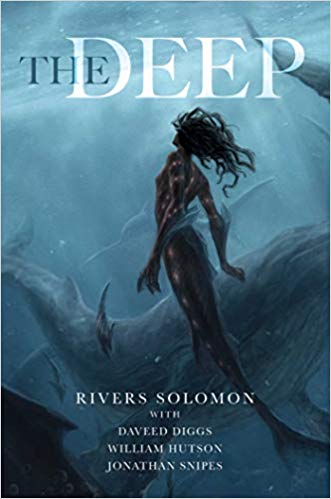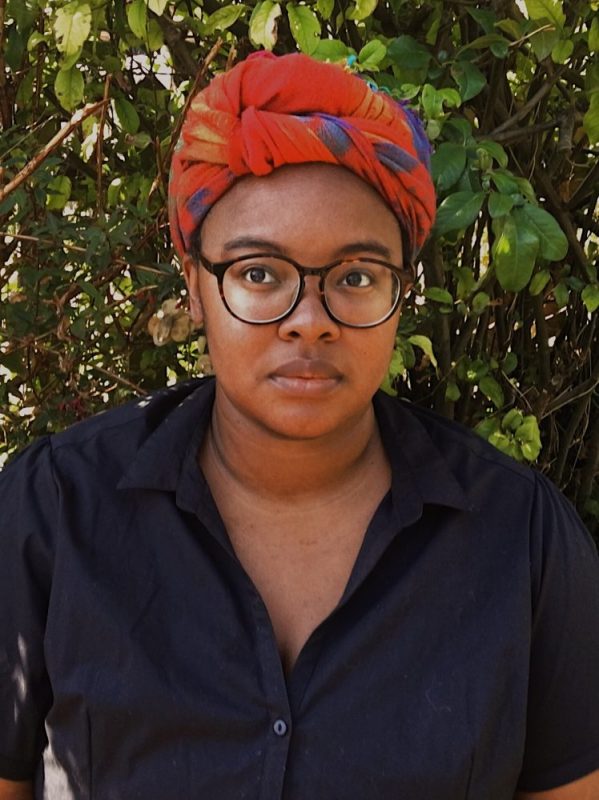There are some books that you know will be important from the first page. Sometimes it’s the subject matter, sometimes it’s the author, and sometimes it’s the sheer mesmerism of the language. With The Deep, it’s all of those and more. It’s astonishing to me that no one has thought to tell the story of the slaves thrown into the sea, but then, I can think of few people better than Rivers Solomon to do that telling. She was inspired by the clipping song “The Deep” by Daveed Digs, William Hutson, and Jonathan Snipes, another beautiful and relentless work you should listen to before diving into this book. But the book is its own entity, filled with Solomon’s strong and supple prose. Their voice is so strong and yet so tender, and their prose is so clear and yet so rapturous. From start to finish, this book sings.

Yetu’s voice, raw with agony, leads the choir. She is the Historian, the repository for the collective memories of the wajinru, fierce mermaid-like creatures who live in the deep sea. They were the children born in the water from pregnant slaves thrown overboard, given tails and fins by the ocean, nursed by whales to maturity. The earliest wajinru did not want their children to bear the burden of grief, but also did not want to forget the lessons of the past. Thus they made a single person the Historian, a living repository of their stories, and instructed that person to share those visceral memories only once a year. But the problem with the past is that it just keeps on accumulating. The current Historian, Yetu, now staggers under the weight of what she knows—and what the others do not.
This book sets up two distinct axes, one the spectrum between individual and community, and the other between the past and the present. I could say “between remembering and forgetting,” but the memories Yetu contains are so potent that the present drops away entirely, and the past consumes all. Due to her extraordinary sensitivities, Yetu is particularly susceptible to this effect, and the book opens with her having lost a large chunk of time as she wandered insensate, thinking she was in the past. She barely eats and wanders into dangerous places: the memories are slowly killing her. But what is worth more, her own survival, or the traditions of her people?
The heart of the story has elements of The Giver and “The Ones Who Walk Away from Omelas,” with Yetu as Jonas or the child scapegoat respectively. The important differences are that, unlike “The Ones Who Walk Away from Omelas,” the rest of the community does not want Yetu to suffer. They celebrate her with gifts, do their best to respect what they see as her strangeness, and try to make a place of honor for her. And unlike The Giver, the community is not artificially suppressing individual memories or feelings. Every wajinru is able to recall the facts of their own lives and feel the full range and depth of emotions. What they reject (on a day-to-day basis) is ancestral history, and communal emotion. Their collective origins are so tragic, so brutal, that to remember is to get sucked into the ever-tightening spirals of rage and grief.

The wajinru and Yetu may speak the same language, but they lack a common understanding. Part of this is the wajinru’s inability to perceive suffering. Because they live unburdened the weight of the past, their capacity for empathy is diminished. Part of it is also Yetu’s difficulty with communication. Because she was given the memories at such a young age, she didn’t fully develop her sense of self or her communication skills. Her heightened bioelectric sensitivity (which reads a bit like autism spectrum sensitivity) even makes the ocean currents abrasive to her skin. With so much of the world already overwhelming, finding the words to convince others of her complex pain is daunting.
This gap in communication even among such a loving community is a powerful reminder that even well-meaning inequality is still inequality. The wajinru can’t stop calling the title of Historian an honor; Yetu can’t call it anything other than a torture. The linguistic difficulties get at deeper issues of empathy, and of emotional labor. Expecting one person to do the emotional labor of an entire community might make philosophical sense in a kind of “trolley problem” way, but it’s not an ethical solution if there is a third way forward that doesn’t privilege either the group or the individual.
Yetu journeys very far to find a new way forward, one that does not rely on her continual self sacrifice for the benefit of the group, but also one that permits the wajinru to mitigate the burden of their history. It’s a journey of self-discovery but also one that never loses sight of those two critical axes, self and present, community and past. Yetu needs all four to reach a greater peace for herself and the wajinru, and the way she finds it is just as complex and beautiful as you would hope.
The Deep is out in one week, on November 5th.
